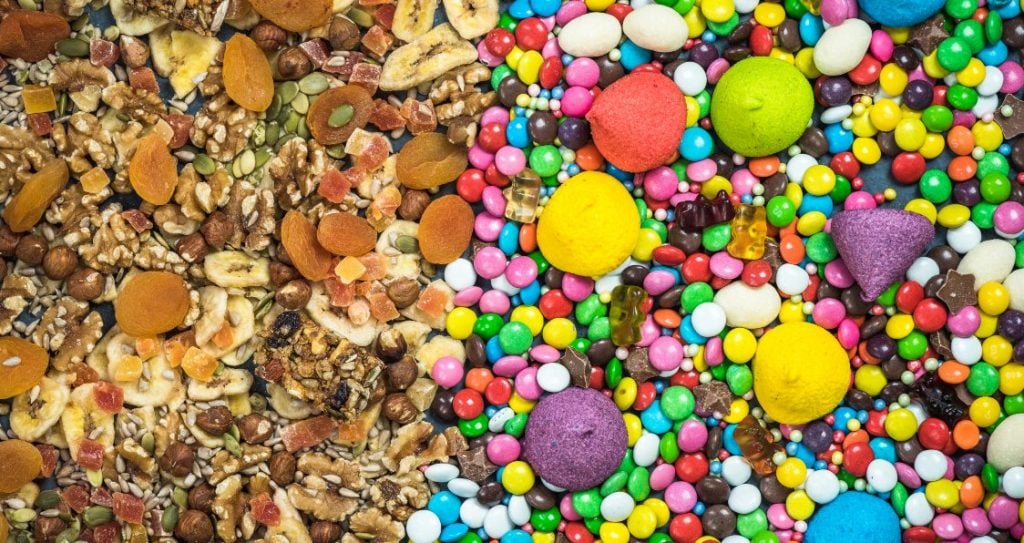Cheat Meals Can Help You Lose Weight
It’s possible to eat your favorite foods and still lose weight. Actually, eating your favorite foods, occasionally, can help boost weight loss.
There’s a bunch of false information surfing the internet about how losing weight only comes from eating “clean” foods. And while eating clean foods helps, weight loss comes from an energy deficit, regardless of the foods you choose to eat.
Not only that, but you need to eat enough calories to maintain and build muscle mass, which is important for losing weight and building an astonishing physique, and including your favorite foods will help make sure you’re eating enough calories. Plus, it will make your weight loss journey more sustainable since it won’t make losing weight a total buzzkill.
Below, find out how cheat meals can be beneficial for your weight loss goal.
Calories In Vs. Calories Out
The reason you’ll be able to lose weight when eating cheat meals is simple. Losing weight comes down to your calories in vs. your calories out (1). If you intake fewer calories than you’re burning, you’ll lose weight. No matter what you eat! This means you can go on an all candy diet like this doctor and still lose weight.
However, that’s not the healthiest approach to take since eating healthier foods will provide your body with the vitamins and minerals it needs to function properly. But if you don’t care about your health and just want to lose as much weight as possible while enjoying your favorite foods, then it’s probably nice to know that you have the option to eat whatever you want and still lose weight.
Aside from the health benefits eating healthy brings you though, eating your proper personal macronutrients will also affect how you look. To build your best-looking physique, you’ll need to make sure you’re eating adequate amounts of protein, and cookies, cake, and pizza just won’t give you the protein you need for maximal muscle growth (2).
With that being said, I recommend you follow flexible dieting — eating healthy 80% of the time and 20% of the time you can eat whatever you want – so long as you’re hitting proper nutritional targets — calories, protein, fat, and carbs. This will allow you to eat your favorite foods in moderation, have optimal health, and build your best physique.
Importance of Building Muscle for Weight Loss
When many people go into the gym to lose weight, they place way too much emphasis on cardio. That’s why oftentimes you’ll see overweight people spending all their time on the treadmill and elliptical machines. And while some cardio is beneficial for your health and for fat loss, strength training is much better for weight loss. That’s because the more muscle you have, the faster your metabolism will be, meaning you’ll burn more calories throughout the day (3).
Calories Are Imperative for Muscle Mass
In order to build optimal muscle mass though to rev up your metabolism, you’ll need to make sure you’re consuming enough calories. And there’s no better way to consume more calories than to eat some good ole’ cheat meals. Junk food has more calories than “healthy” foods, which means it will be a lot easier for you to eat more. Plus, it’s not punishment either indulging in your favorite desserts.
Low-Calorie Diets Are Bad
And while making sure you’re in a caloric deficit is important for weight loss, spreading yourself too thin with a calorie restriction has its drawbacks. For one, it’s not a sustainable way to lose weight. You’ll end up burning out and never reaching your weight loss goal.
Studies show that low-calorie diets can decrease the number of calories you burn (4).
Another issue with low-calorie diets is that they destroy your metabolism since they deteriorate your muscle mass (5). Your muscles need enough calories to give them the energy to not only build more muscle but to also hold onto the muscle you have. If you’re not eating enough, then you’ll slow down your metabolism since you’ll have less muscle.
This is why having some cheat meals here and there can be beneficial for making sure you’re eating enough calories.
Refeed Days Benefits
Now, this doesn’t mean I’m giving you permission to go on an all-out eating spree. That will only prolong you reaching your goals and will end up making you hold onto some unwanted fat. However, I’m allowing you to have some wiggle room with your diet, and actually, I recommend you do. There are smarter ways to go about this though.
A good way to allow yourself some room for cheat meals is by having a refeed day once a week. On this day, you’ll consume about 20-30% calories more than normal, which you can get from your favorite foods. This will ramp up your metabolism and help you build more muscle and maintain muscle mass while cutting weight.
In fact, this study investigating subjects undergoing a calorie restriction for 7 weeks found that those who had a 2 day refeed day helped preserved their resting metabolic rate (6).
That’s because putting your body in a continuous caloric deficit lowers your leptin levels, which hurts your body’s fat-burning process. Including a refeed day into your diet will temporarily increase your leptin levels to prevent adaptive thermogenesis, a survival process that may interfere with weight loss (7).
Benefits of Cheat Days
Although cheat days get a bad rep, they’re warranted and will make reaching your weight loss goal easier, more enjoyable, and sustainable. Below is a list of different benefits of having some cheat meals/days.
- Makes weight loss sustainable
- Revs-up your metabolism
- Helps you maintain muscle when cutting
- Helps you build muscle
- Makes your life more enjoyable
Don’t Go OverBoard
So now you have been given the pass on pigging out on your favorite foods from time to time guilt-free but be sure you don’t go overboard with it. Just like losing weight comes down to burning more calories than you consume, gaining weight is the reverse — consuming more calories than you burn. And as you likely know, that’s easy to do with cheat meals. That’s why I recommend only a couple of cheat meals a week on refeed days or allowing yourself a little wiggle room each day for your favorite snack or two, in moderation, of course.
Conclusion
Losing weight can suck at times. Oftentimes, that means going on a very low-calorie diet and cutting out your favorite foods for many people. However, having an occasional cheat meal won’t mess up your progress and will make weight loss more enjoyable, sustainable, and easier to achieve.
What’s your favorite cheat meal? Tell us and follow us on Instagram and Facebook.
References
1 – Strasser, B., Spreitzer, A., & Haber, P. (2007). Fat loss depends on energy deficit only, independently of the method for weight loss. Annals of nutrition & metabolism, 51(5), 428–432. https://doi.org/10.1159/000111162
2 – Carbone, J. W., & Pasiakos, S. M. (2019). Dietary Protein and Muscle Mass: Translating Science to Application and Health Benefit. Nutrients, 11(5), 1136. https://doi.org/10.3390/nu11051136
3 – McPherron, A. C., Guo, T., Bond, N. D., & Gavrilova, O. (2013). Increasing muscle mass to improve metabolism. Adipocyte, 2(2), 92–98. https://doi.org/10.4161/adip.22500
4 – Müller, M. J., & Bosy-Westphal, A. (2013). Adaptive thermogenesis with weight loss in humans. Obesity (Silver Spring, Md.), 21(2), 218–228. https://doi.org/10.1002/oby.20027
5 – Willoughby, D., Hewlings, S., & Kalman, D. (2018). Body Composition Changes in Weight Loss: Strategies and Supplementation for Maintaining Lean Body Mass, a Brief Review. Nutrients, 10(12), 1876. https://doi.org/10.3390/nu10121876
6 – Campbell et al. 2020. Intermittent Energy Restriction Attenuates the Loss of Fat Free Mass in Resistance Trained Individuals. A Randomized Controlled Trial. J. Funct. Morphol. Kinesiol.2020, 5(1), 19; https://doi.org/10.3390/jfmk5010019
7 – Dirlewanger, M., di Vetta, V., Guenat, E., Battilana, P., Seematter, G., Schneiter, P., Jéquier, E., & Tappy, L. (2000). Effects of short-term carbohydrate or fat overfeeding on energy expenditure and plasma leptin concentrations in healthy female subjects. International journal of obesity and related metabolic disorders : journal of the International Association for the Study of Obesity, 24(11), 1413–1418. https://doi.org/10.1038/sj.ijo.0801395










